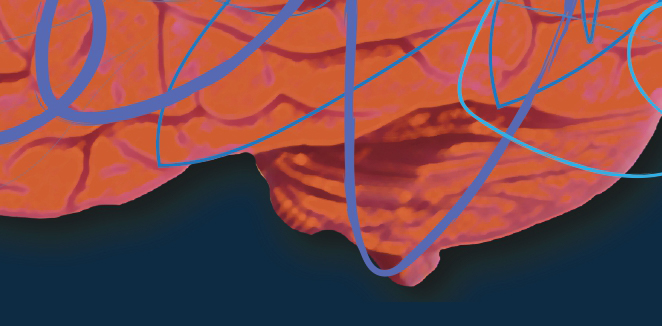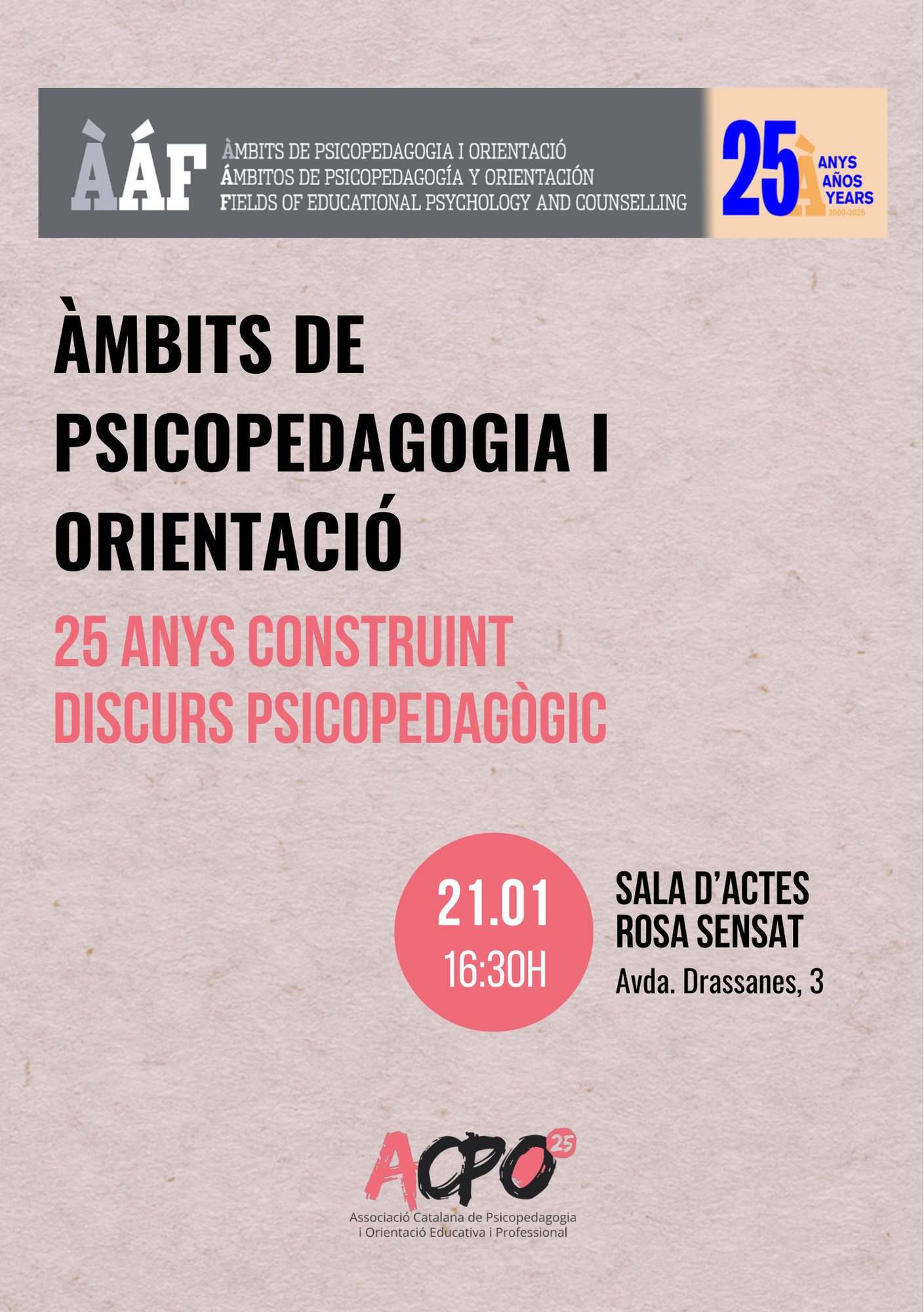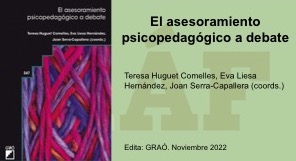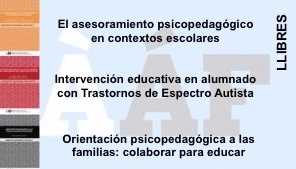Teràpia d’acceptació i compromís amb familiars de fills/es amb discapacitat intel·lectual: un estudi pilot
DOI:
https://doi.org/10.32093/ambits.vi55.5030Paraules clau:
Parentalitat, Flexibilitat psicològica, Discapacitat, Teràpies contextuals, Teràpia d’acceptació i compromís, ACT, Estrès parentalResum
L’objectiu de l’estudi és la valoració dels resultats d’un programa d’intervenció grupal des de la Teràpia d’Acceptació i Compromís dirigit a familiars de fills/es amb diagnòstic de discapacitat intel·lectual lleugera. En l’estudi van participar quatre mares i un pare pertanyents a una associació de discapacitat. Per valorar l’efectivitat de l’entrenament es van emprar autoinformes per mesurar la flexibilitat parental, supressió de pensaments, estrès percebut i salut psicològica, així com autoregistres per mesurar els canvis en les interaccions amb els fills/es. Els resultats van mostrar que després de l’entrenament i en el seguiment, als 2 mesos es va incrementar significativament la flexibilitat psicològica i va disminuir la supressió de pensaments negatius. La magnitud de l’efecte va ser elevada, a més d’en aquestes variables, en estrès percebut i salut psicològica. A més, es va observar un increment d’interaccions plaents amb fills/es amb discapacitat. L’estudi va revelar la potencial utilitat d’aquesta intervenció i va justificar i aportar claus rellevants per a un estudi posterior amb una mostra més àmplia. Entenem que amb el desenvolupament del programa d’intervenció podríem posar en mans dels professionals de la orientació i de les famílies un instrument amb la capacitat de millorar la qualitat vida de les persones amb discapacitat, i dels seus familiars.
Referències
Blackledge, J. T. y Hayes, S. C. (2006). Using acceptance and commitment training in the support of parents of children diagnosed with autism. Child & Family Behavior Therapy, 28(1), 1-18.https://doi.org:10.1300/J019v28n01_01
Brinker, R. P., Seifer, R. y Sameroff, A. J. (1994).Relations among maternal stress, cognitive development, and early intervention in middle- and low-SES infants with developmental disabilities. American Journal on Mental Retardation, 98(4), 463–480.
Cantwell, J., Muldoon, O. T. y Gallagher, S. (2014). Social support and mastery influence the association between stress and poor physical health in parents caring for children with developmental disabilities. Research in developmental disabilities, 35(9), 2215-2223.https://doi.org:10.1016/j.ridd.2014.05.012
Cohen, S., Kamarck, T. y Mermelstein, R. (1983).A Global Measure of Perceived Stress.Journal of Health and Social Behavior, 24(4), 385-396. https://doi.org/10.2307/2136404
Crnic, K.A., Neece, C.L., McIntyre, L.L., Blacher, J. y Baker, B.L. (2017). Intellectual Disability and Developmental Risk: Promoting Intervention to Improve Child and Family Well Being. Child Developement, 88, 436-445. https://doi.org/10.1111/cdev.12740
Flujas-Contreras, J. M., García-Palacios, A. y Gómez, I. (2020). Spanish validation of the Parental Acceptance Questionnaire (6-PAQ). International Journal of Clinical and Health Psychology, 20 (2), 163-172. https://doi.org/10.1016/j.ijchp.2020.03.002
Gloster, A. T., Lamnisos, D., Lubenko, J., Presti, G., Squatrito, V., Constantinou, M., ... &Karekla, M. (2020). Impact of COVID-19 pandemic on mental health: An international study. PloSone, 15(12), e0244809. https://doi.org/10.1371/journal.pone.0244809
Goldberg, D. y Bridges, K. (1987). Screening for psychiatric illness in general practice: the general practitioner versus the screening questionnaire. The Journal of the Royal College of General Practitioners, 37(294), 15-18.
Gould, E. R., Tarbox, J. y Coyne, L. (2018). Evaluating the effects of acceptance and commitment training on the overt behavior of parents of children with autism. Journal of Contextual Behavioral Science, 7, 81-88.https://doi.org/10.1016/j.jcbs.2017.06.003
Greene, R. L., Field, C. E., Fargo, J. D. y Twohig, M. P. (2015). Development and validation of the parental acceptance questionnaire (6-PAQ). Journal of Contextual Behavioral Science, 4(3), 170-175.https://doi.org/10.1016/j.jcbs.2015.05.003
Hahs, A. D., Dixon, M. R. y Paliliunas, D. (2019). Randomized controlled trial of a brief acceptance and commitment training for parents of individuals diagnosed with autism spectrum disorders. Journal of Contextual Behavioral Science, 12, 154-159.https://doi.org/10.1016/j.jcbs.2018.03.002
Harris, R. (2019). ACT made simple: An easy-to-read primer on acceptance and commitment therapy. New Harbinger Publications.
Hauser-Cram, P., Nugent, J. K., Thies, K. y Travers, J. F. (2013). The Development of Children and Adolescents: An Applied Perspective. John Wiley y Sons.
Hayes, S. C., Strosahl, K. D. y Wilson, K. G. (1999/2014). Terapia de Aceptación y Compromiso: Proceso y práctica del cambio consciente (Mindfulness). Bilbao: Desclee de Brouwer
Hayes, S. C. y Hofmann, S. G. (2017). The third wave of cognitive behavioral therapy and the rise of process based care. World Psychiatry, 16 (3), 245. https://dx.doi.org/10.1002%2Fwps.20442
Jacobson, N. S. y Truax, P. (1991). Clinical significance: A statistical approach to defining meaningful change in psychotherapy research. Journal of Consulting and Clinical Psychology, 59, 12-19.https://doi/10.1037/10109-042
Lewallen, A. C.yNeece, C. L. (2015). Improved social skills in children with developmental delays after parent participation in MBSR: The role of parent–child relational factors. Journal of Child and Family Studies, 24(10), 3117–3129. https://doi.org/10.1007/s10826-015-0116-8
Wilson, K. y Luciano, M. C.(2002). Terapia de aceptación y compromiso. Madrid: Pirámide.
MacDonald, E. E., Hastings, R. P. y Fitzsimons, E. (2010). Psychological acceptance mediates the impact of the behaviour problems of children with intellectual disability on fathers’ psychological adjustment. Journal of Applied Research in Intellectual Disabilities, 23(1), 27-37.https://doi.org/10.1111/j.1468-3148.2009.00546.x
Moreira, H. y Canavarro, M. C. (2017).Psychometric properties of the Interpersonal Mindfulness in Parenting Scale in a sample of Portuguese mothers. Mindfulness, 8(3), 691-706.http://dx.doi.org/10.1007%2Fs12671-016-0647-0
Navas, P., Verdugo, M. A., Amor, A. M., Crespo, M. y Martínez, S. (2020). COVID-19 y discapacidades intelectuales y del desarrollo: impacto del confinamiento desde la perspectiva de las personas, sus familiares y los profesionales y organizaciones que prestan apoyo. Plena inclusión España e Instituto Universitario de Integración en la Comunidad (INICO), Universidad de Salamanca.
Osborne, L. A., McHugh, L., Saunders, J., & Reed, P. (2008). The effect of parenting behaviors on subsequent child behavior problems in autistic spectrum conditions. Research in Autism Spectrum Disorders, 2, 249–263. https://doi.org/10.1016/j.rasd.2007.06.004
Remor, E. (2006).Psychometric properties of a europeanspanish version of the Perceived Stress Scale (PSS).The Spanish Journal of Psychology, 9, 86-93. https:// doi/10.1017/S1138741600006004
Rosenthal, R. (1994). Science and ethics in conducting, analyzing, and reporting psychological research. Psychological Science, 5(3), 127-134. https://doi.org/10.1111%2Fj.1467-9280.1994.tb00646.x
Sánchez-López, M.P. y Dresch, V. (2008). The 12-Item General Health Questionnaire (GHQ12): Reliability, external validity and factor structure in the Spanish population. Psicothema, 20, 839-843.https://doi.org/10.1080/03630240802575096
Sanz, J. y García-Vera, M. P. (2015). Técnicas para el análisis de diseños de caso único en la práctica clínica: ejemplos de aplicación en el tratamiento de víctimas de atentados terroristas. Clínica y Salud, 26(3), 167-180. http://dx.doi.org/10.1016/j.clysa.2015.09. 004
Scherer, N., Verhey, I.yKuper, H. (2019). Depression and anxiety in parents of children with intellectual and developmental disabilities: A systematic review and meta-analysis. PloSone, 14(7), e0219888.https://doi.org/10.1371/journal.pone.0219888
Wegner, D. M. y Zanakos, S. (1994). Chronic thought suppression. Journal of personality, 62(4), 615-640.https://doi.org/10.1111/j.1467-6494.1994.tb00311.x
Whittingham, K. Sanders, M., McKinlay, L. y Boyd, R. N. (2014). Interventions to reduce behavioral problems in children with cerebral palsy: An RCT. Pediatrics, 133, 1-9.https://doi.org/10.1542/peds.2013-3620

Descàrregues
Publicades
Número
Secció
Llicència
Els autors/ores conserven els drets d'autor i concedeixen a la revista el dret de primera publicació de l'obra, registrada sota una llicència Creative Commons Reconeixement-NoComercial-Sense Obra Derivada. Aquesta llicència permet la descàrrega de les obres, i que es puguin compartir amb altres sempre que se’n reconegui l'autoria, però no permet que siguin modificades de cap manera, ni ser utilitzades amb finalitat comercial.
















